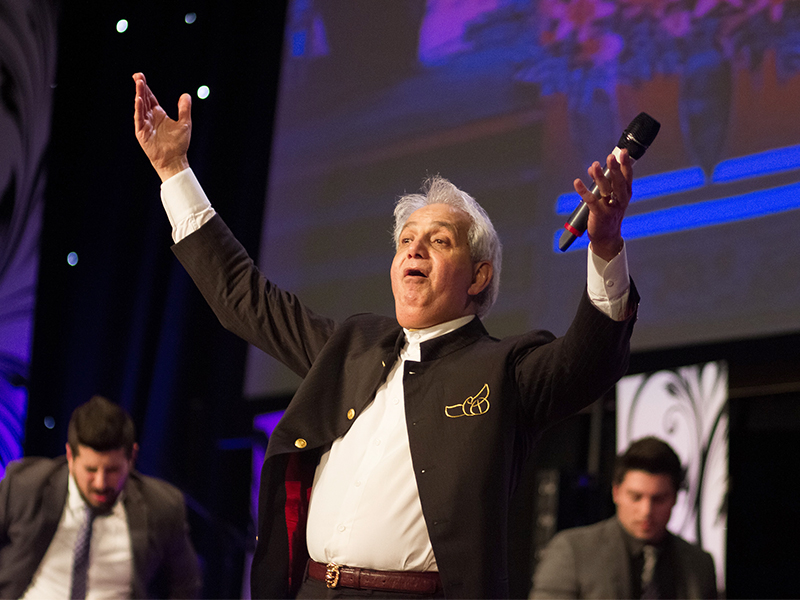
Pastor Benny Hinn leads a service on Jan. 27, 2014. Photo courtesy of House of Praise/Creative Commons
(RNS) — Last week, Benny Hinn, prominent charismatic healing evangelist and prosperity preacher, again renounced his adherence to the prosperity gospel by declaring that “the blessings of God are not for sale.”
The egregious form of prosperity preaching that Hinn now renounces is easy to spot and reject because this kind of preaching often appeals to giving specific amounts of money so that healing, victory, financial breakthrough, personal fulfillment will be granted by God.
But there are many prosperity gospels that hold out the promise of victory, success, actualization, a sense of “arrival” and the good life for the faithful who adhere to the correct precepts. These teachings often see Jesus as a means to an end, a way to improve our lives or society or to attain power so we can make life better. What they have in common is a sense that our limitations and “lack” are defining and that we can find wholeness by following the right steps or formulas for success.
RELATED: Is televangelist Benny Hinn renouncing the prosperity gospel?
One example came just two weeks ago in a message about David and Goliath by Steven Furtick, pastor of Elevation Church in North Carolina, that made it onto social media. In speaking about how a Christian has to fight through adversity to attain victory, Furtick said that “Goliath has got your sword, Goliath has got your grace. And if you want to see the victory, you’re going to have to defeat what’s standing in front of you.”

Pastor Steven Furtick preaches about David and Goliath at Elevation Church. Video screengrab
The idea here is that your position is enhanced and actualized through the process of exercising your faith and battling through opposition to grasp your victory. That sounds good on the surface, as we all want to do our part, but it ultimately leaves the hearer in frustration. The point of the story is that God uses the weak to defeat giants; he is the one who has the victory. David himself said to Goliath: “For the battle is the Lord’s and he will give you into our hand.”
A slightly different way of asking us to strive in some way for an improved position came recently from Al Mohler, president of Southern Baptist Theological Seminary, when he bemoaned the decline of the family and birth rate in contemporary America — a concern that I share, by the way.
“Americans are basically, by millions, giving up on the fact that to be human is to be a parent, eventually to take on that responsibility to get married and have children, to take on the responsibility of passing on civilization itself,” Mohler said.
He later clarified that he was simply talking about the importance of family, which I affirm, but his overstatement left the reader with the idea that our humanity is not inherent, but something we have to grasp for and actualize through reproduction. We should be more careful with our words, especially in the defense of a pro-life position. We are already fully human whether we are parents or not.
There are things we should do, of course, to obey and follow God, and sin does have consequences, but prosperity teaching goes beyond that. It tells us that we can have more, do more and be more if we just exercise faith and follow the prescribed steps.

Photo by Himsan/Creative Commons
For much of my childhood, I prayed deeply for healing for my blind right eye. As a young child, I became aware that my blindness was a physical limitation and I began to feel “less than” and a bit deformed. My family went to charismatic churches, and while there was much good there, there was also a growing “faith” perspective that connected the healing and blessing we receive from God with the amount of faith we exhibited and effort we demonstrated.
I heard the preacher talk about “wholeness” and health and healing and how God wanted to make everything right and I wondered if he would fix me. Would he make me like the other kids and heal my eye so I could be whole and fully human?
But something rose up in me and rejected that as untrue. My faith in God wasn’t dependent on him healing me or everything working out. As time went on and I kept praying and reading the Bible, I learned that I was loved by God as he made me and that I didn’t have to have the healing or blessing to be made whole. I asked God for mercy, and whether I received this particular mercy of physical healing did not change who God was or how he saw me.
RELATED: Joshua Harris and the sexual prosperity gospel
It’s not only churches that preach the prosperity gospels. They exist in media, politics, in teachings about marriage and family and money and health. Many of these teachings end up devolving into an attempt to control and to protect, promote and defend our “way of life” through fear.




